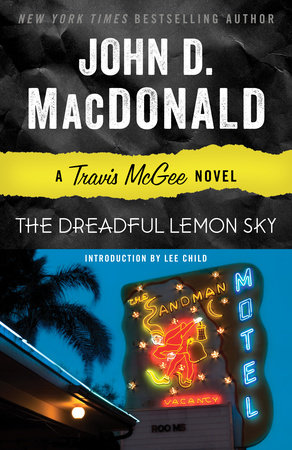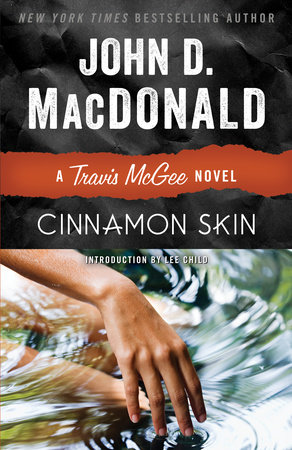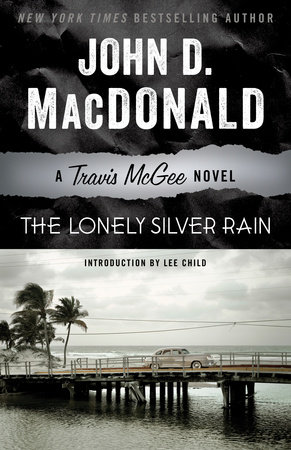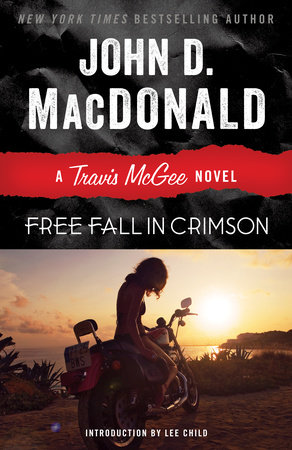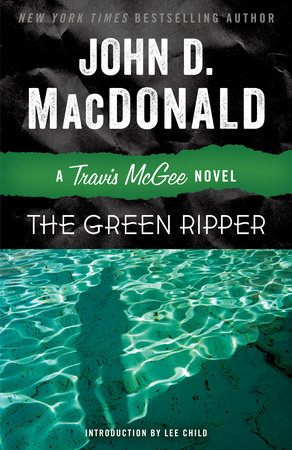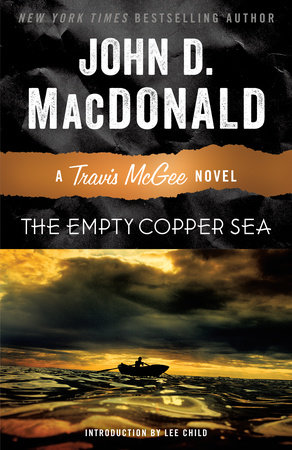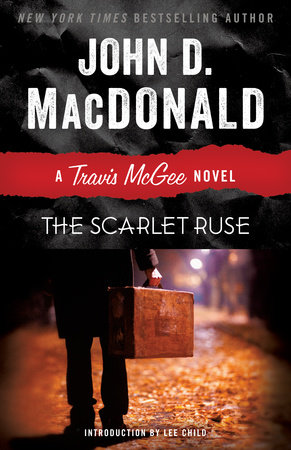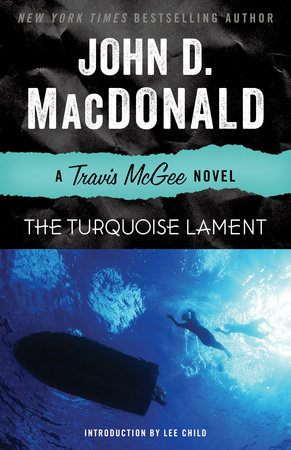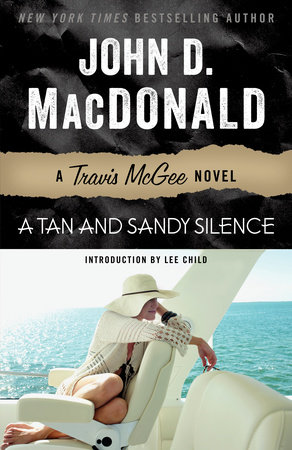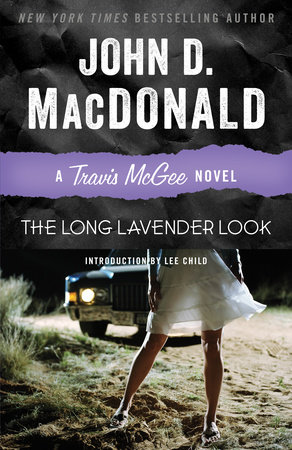Excerpt
The Dreadful Lemon Sky
One
I was in deep sleep, alone aboard my houseboat, alone in the half acre of bed, alone in a sweaty dream of chase, fear, and monstrous predators. A shot rang off steel bars. Another. I came bursting up out of sleep to hear the secretive sound of the little bell which rings at my bedside when anyone steps aboard the Busted Flush. It was almost four in the morning.
It could be some kid prowling the decks for a forgotten camera, portable radio, or bottle of Scotch. Or a friendly drunk. Or a drunken friend. Or trouble. I could not know how long I had slept past the first ting of the bell. I pulled on a pair of shorts and went padding through the blackness, past the head and the galley, through into the lounge to the locked doorway that opens onto the sheltered deck aft. The handgun which I had slipped from its handy recess before I was totally awake felt cold in my grasp.
I heard a small knocking sound, secret and tentative. “Trav?” A husky, half-whispering girl voice. “Trav McGee? Trav, honey?”
I moved over to where I could see through the glass at an angle, just enough to make out the girl shape of the small figure huddled close to the door, out of the brightness of the dock lights. She seemed to be quite alone.
I called through the closed door, “Who are you?”
“Trav? Don’t turn on any lights, huh? Please!”
“Who is it?”
“It’s me! It’s Carrie. Carrie Milligan.”
I hesitated, then sheathed the revolver under the waistband of the shorts, cold against belly flesh. I unlocked and let her in and locked the door again.
She hooked one arm around me and hugged her small self tightly against me and let out a long breath. “Hey, hello,” she said. “No lights. Okay? I don’t want to get you involved.”
“Lights will get me involved?”
“You know what I mean. If somebody was close, if they knew I came over toward this way and they watched and saw lights go on here, then they’d want to find out.”
“So I can black out the captain’s quarters.”
“Sure. It’ll be easier to talk.”
I took her by the hand and led her back through the darkness. Just enough light came in so that the lounge furniture made bulky shapes to the left and right. When we reached my stateroom I released her and pulled both thicknesses of draperies across the ports. Then I turned on a light, the reading lamp over the bed which makes a bright round pattern on a book and leaves the rest of the room in darkness. It shone on the wrinkled sheets of recent dreams and bounced off, illuminating her in soft light.
She had hugged me with one arm because she held a package and her purse in the other. The package was the shape of a shoe box, wrapped in brown paper, tied with cord.
“I know, I know,” she said, backing away from the light. “I’m not wearing very damn well. I’m not lasting so good. What’s it been? Six years. So I was twenty-four, right? And now I look forty.”
“How’s Ben?”
“I wouldn’t have the faintest idea.”
“Oh.”
“Yes, it’s like that. I haven’t lived with him in . . . over three years. I threw him the hell out.”
“Oh.”
“Stop saying ‘Oh.’ You know, I felt a little pinch when I saw this great old boat. I really did. I didn’t know I could feel anything like that, related to Ben. I thought it was all gone. But we were happy aboard this crock. It was the only really happy time, I think. Shiny new marriage, and not a dime in the world, but a great boat to have a honeymoon aboard.” She sat in the chair in the corner by the locker, out of the light. In a different voice she said, “I should have settled for you.”
“You figured I wouldn’t marry anybody,” I said. I sat on the bed, facing her.
“I know, I know. What I don’t know is why I was so red hot to get married. So I married Ben Milligan. Jesus! Know what he was, really? He was a child bride. His mother spent twenty-five years picking up after him, waiting on him, telling him how great he was, and then she turned him over to me. Whine, whine, whine. He couldn’t hold a job. Nobody appreciated him. Bitch, bitch, bitch. He had like fourteen jobs in two years, and the last part of that two years, he didn’t even look. He stayed home and watched the soaps on TV. He did all that body-building stuff all the time. Muscles on muscles. When I came home from work, I was supposed to cook, or at least stop on the way home and buy pizza or hamburgers. Trav, couldn’t you tell what he was like?”
“Sure.”
“Couldn’t you have said something?”
“And lose an eye?”
“Okay, so I was in love. Thank God for no kids. I think it was him, not me. But he wouldn’t go see a doctor about it. He got very grumpy that I could say anything might be wrong with the perfect body. Look, McGee, it was all a long time ago. All forgotten. I didn’t come here to talk about my great married life. I was thinking on the way here, I don’t really know Travis McGee. But you made me feel close to you, way back. I had to find somebody I could trust. I went through an awful lot of names. I came up with you. Then I started thinking, Maybe he’s got somebody aboard with him, or somebody lives aboard, or he’s away, or he’s married. My God, it’s six years. You know? I stepped aboard and six years were gone. You look great. You know it? Absolutely great. You haven’t changed at all. It isn’t fair. Look at me!”
It happens to people. They get up to the point of explaining the mission and can’t make it, so they go into a talking jag. She needed help. There was a thin edge of anxiety in her tone, and the words came too fast.
So I gave her some help. “What have you got in the box?” I asked.
She exhaled harshly. Almost a gasp. “You get right to it, don’t you? What have I got in the box? In this here box, you mean? Once you said you had a safe place for things. Do you still?”
“Yes.”
She came over and put the package on the bed beside where I was sitting. She grasped the cord and popped it with a swift sure motion. She stripped the brown paper off. Meyer says whole tracts could be written about character revealed in opening a package.
“What I’ve got in this box,” she said, “is money.”
She lifted the lid. It was money. It was packed in tightly. Used bills, some loose, most tied into tidy bricks with string, with adding-machine tape tucked under the string. “I’ve got here ninety-four thousand two hundred dollars. Plus ten thousand for you, for keeping it until I want it.”
“No need for that.”
“It’s worth that to me. And I’d feel better.”
“Can I ask any questions?”
“Hardly any. That’s part of the fee.”
“Stolen?”
“Like from a bank or payroll or something? No.”
“And if you don’t come back?”
“I’ll be back to get it before . . . what’s today?”
“Early early in the morning of May the sixteenth, a Thursday.”
“Okay, if I don’t come get it before the fifteenth of June, or get some kind of word to you before the fifteenth of June, then I’m not coming at all. So it should go to my sister, Susie. Do you remember my maiden name?”
“Dee. Carrie Dee.”
“That was short for Dobrovsky. She uses the whole name. Susie . . . Susan Dobrovsky. You get it to her. That’s part of the fee. And not telling anybody at all about me being here. That’s the rest of the way you earn ten.”
“Where is your sister?”
“Oh. Sorry. She’s in Nutley, New Jersey. She’s younger. She teaches nursery school. She’s now like about the age I was when I knew you before. Twenty-three? Yes. Two months ago. She’s nice, but . . . dumb about things. She doesn’t know how things are yet. Wouldn’t it be nice if she didn’t have to find out? Look, will you put this in a safe place and keep it for me?”
“Yes, of course.”
She swayed, took one dizzy step, and turned around abruptly and sat down on my bed beside the box, bouncing it, spilling the bricks of money. She shook her head. “I’m dead for sleep. And I’m dirty, Trav. I’ve been in these same clothes too long. I can smell myself. These clothes, they ought to be buried. For the ten thousand, dear, could I ask for three more things?”
“Like a bath, a place to sleep, and a change of clothes?”
“I’m a size ten.”
After she was throat deep in the big tub, sploshing and sudsing, scrubbing her cropped pale hair along with the rest of her, I located an old surplus ammo box, the kind with the rubber gasket and the flat metal lever that fastens it safely tight. I moved the money, all except the ten thousand, into the ammo box and put that forward in the flooded area between the double hull. I added the ten to my own cache, mentally adding another four or five months to my retirement. I retire whenever I can afford it. When the money is gone, I go back to work. Salvage work. Retirement comes when you are too old to enjoy it completely, so I take some of mine whenever I can. What good are beaches without beach bums? What would the little vacationing lady urchins do for their holiday pleasures were not some of us out there wastreling away? After the large money was all stowed and quite safe, I went digging into the big locker drawer under the bed in the guest stateroom. It is always packed with girl clothes. They get left aboard. They are purchased in the ports I can reach with my old houseboat, and they are left aboard for another time. No trouble to have them cleaned and put them away. And having the supply facilitates spur-of-the-moment decisions.
I found her some navy flairs and a pink sleeveless turtleneck shirt. And I found the kind of terry robe which fits anyone. It fit her and dragged on the floor behind her. She helped me make up the guest bed. She was yawning with every second breath. Her eyes were glazed with fatigue. When I went in not more than three minutes later to ask her if she’d like some hot chocolate or a drink, she interrupted the question with a long, gentle, purring snore.
I stood for a few minutes leaning against the doorframe, looking at her in the semidarkness, remembering her. I remembered the pre-Ben Carrie Dee, a pretty girl who worked at Peerless Marine and was seen now and again at some of the parties in and around Bahia Mar. We are never the best judges of what is meaningful and what is trivial in our lives, I guess. The accidents of time and place change the script, and later we say it happened on purpose.
Carrie didn’t happen to me on purpose. Or I to her. There was a TV crew at Bahia Mar making a commercial. The Alabama Tiger had them at his permanent floating house party every night of the week they were there. The boss fellow was squat and hairy and very loud. Mod clothes and a glossy wig and a conviction that his profession and personality made him irresistible. I went topside at midnight on the ’Bama Gal to get some air and see if there were any stars to look at. Boss Fellow had a girl down on the deck by the over-turned dinghy and was mauling her around, riding her clothes up over her hips as she kicked and bleated and yelped, her protests lost in the Tiger’s two hundred amps of speakers.
I plucked him off her and, while he flailed and cursed, I carried him to a place along the rail where I could get a clear drop into the boat basin. He made a mighty splash after the twelve-foot drop. When I was sure he could swim, I let him fend for himself. It was Carrie, and she was not in great shape. She was ripped and scuffed and close to hysterics. She was certainly in no shape to rejoin the party, so I walked her back to the Busted Flush and found some clothes that would fit her. She spent a half hour alone in the head, getting herself back together.
It had shaken her badly. He had come all too close to taking her. She looked spooked and sallow. By all the accepted rules of human behavior, she should have been so turned off by the near rape she would have felt neuter for quite a while. And I should have been reluctant to give her any new reason for alarm. But in some strange way the episode became a stimulant. We sat and talked, moved closer and talked, moved closer yet and kissed, and I took her to bed. It was a very gentle time, and very sweet in a strange way. In body language she was saying, This is the way it should be. And I was saying, Replace that memory with this one.
It was an isolated episode. Except perhaps by glance or by fleeting expression, we did not mention it again. Knowing her in that biblical sense changed my status with her to that of benign uncle. She sought me out to ask my advice about how she should live her life. She was so determined, months later, that I should approve of Ben Milligan, I think she convinced herself that I had approved. She wanted a good life. It is not an unusual hope, but a very unusual attainment.
I pulled the door shut. I made myself the drink and dressed while I worked at it. After the drink it was time for juice and coffee. After coffee, it was time to go find her purse. False dawn let a little light into the stateroom. I moved silently on bare feet and found the purse at the pillow end, shoved between mattress and box springs. I eased it out and took it to the galley and opened it at the table in the breakfast booth, under the light.
And hello to you, Carolyn Milligan. Florida registration receipt on a two-year-old Datsun, tag number 24D-1313. I found the car keys and put them in my shirt pocket. The occupation, which used to be given on the driving license, no longer appears there. Assume she is still a secretarial type. I copied down the tag number of the car and the address as given: 1500 Seaway Boulevard, Apt. 38B, Bayside, Florida. Comb, lipstick, dental floss, matchbooks, payroll stub, airplane tickets, used. Misc. intimacies. So Mrs. Milligan worked for Superior Building Supplies in Junction Park in Bayside, Florida, and she made $171.54 per week after deducts. She had been in Jamaica, at a Montego Bay hotel, in April. She had six hundred and some dollars in the purse. And a Master Charge card. And three kinds of pills. Everybody has three kinds as a minimum allowance. It is the creature adjustment to a rapidly changing world.


